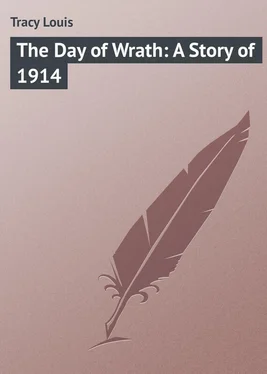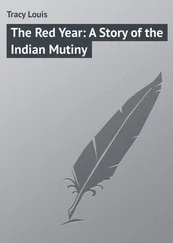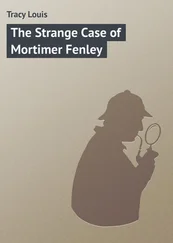Louis Tracy - The Day of Wrath - A Story of 1914
Здесь есть возможность читать онлайн «Louis Tracy - The Day of Wrath - A Story of 1914» — ознакомительный отрывок электронной книги совершенно бесплатно, а после прочтения отрывка купить полную версию. В некоторых случаях можно слушать аудио, скачать через торрент в формате fb2 и присутствует краткое содержание. Жанр: foreign_prose, на английском языке. Описание произведения, (предисловие) а так же отзывы посетителей доступны на портале библиотеки ЛибКат.
- Название:The Day of Wrath: A Story of 1914
- Автор:
- Жанр:
- Год:неизвестен
- ISBN:нет данных
- Рейтинг книги:5 / 5. Голосов: 1
-
Избранное:Добавить в избранное
- Отзывы:
-
Ваша оценка:
- 100
- 1
- 2
- 3
- 4
- 5
The Day of Wrath: A Story of 1914: краткое содержание, описание и аннотация
Предлагаем к чтению аннотацию, описание, краткое содержание или предисловие (зависит от того, что написал сам автор книги «The Day of Wrath: A Story of 1914»). Если вы не нашли необходимую информацию о книге — напишите в комментариях, мы постараемся отыскать её.
The Day of Wrath: A Story of 1914 — читать онлайн ознакомительный отрывок
Ниже представлен текст книги, разбитый по страницам. Система сохранения места последней прочитанной страницы, позволяет с удобством читать онлайн бесплатно книгу «The Day of Wrath: A Story of 1914», без необходимости каждый раз заново искать на чём Вы остановились. Поставьте закладку, и сможете в любой момент перейти на страницу, на которой закончили чтение.
Интервал:
Закладка:
Thus it happened that Chance again took the wanderers under her wing.
A short, thick-set Walloon had emptied a glass of schnapps at the counter of a small drinking-bar which opened on to the street, and was bidding the landlady farewell.
“I must be off,” he said. “I have to be in Visé by daybreak. This cursed war has kept me here a whole day. Who is fighting who, I’d like to know?”
“Visé!” guffawed a man seated at the bar. “You’ll never get there. The army won’t let you pass.”
“That’s the army’s affair, not mine,” was the typically Flemish answer, and the other came out, mounted the wagon, chirped to his horses, and made away.
Dalroy was able to note the name on a small board affixed to the side of the vehicle: “Henri Joos, miller, Visé.”
“That fellow lives in Belgium,” he whispered to Irene, who had draped the shawl over her head and neck, and now carried the jacket rolled into a bundle. “He is just the sort of dogged countryman who will tackle and overcome all obstacles. I fancy he is carrying oats to a mill, and will be known to the frontier officials. Shall we bargain with him for a lift?”
“It sounds the very thing,” agreed the girl.
In their eagerness, neither took the precaution of buying something to eat. They overtook the wagon before it passed the market. The driver was not Joos, but Joos’s man. He was quite ready to earn a few francs, or marks – he did not care which – by conveying a couple of passengers to the placid little town of whose mere existence the wide world outside Belgium was unaware until that awful first week in August 1914.
And so it came to pass that Dalroy and his protégé passed out of Aix-la-Chapelle without let or hindrance, because the driver, spurred to an effort of the imagination by promise of largesse, described Irene to the Customs men as Henri Joos’s niece, and Dalroy as one deputed by the railway to see that a belated consignment of oats was duly delivered to the miller.
Neither rural Germany nor rural Belgium was yet really at war. The monstrous shadow had darkened the chancelleries, but it was hardly perceptible to the common people. Moreover, how could red-fanged war affect a remote place like Visé? The notion was nonsensical. Even Dalroy allowed himself to assure his companion that there was now a reasonable prospect of reaching Belgian soil without incurring real danger. Yet, in truth, he was taking her to an inferno of which the like is scarce known to history. The gate which opened at the Customs barrier gave access apparently to a good road leading through an undulating country. In sober truth, it led to an earthly hell.
CHAPTER III
FIRST BLOOD
Though none of the three in the wagon might even hazard a guess at the tremendous facts, the German wolf had already made his spring and been foiled. Not only had he missed his real quarry, France, he had also broken his fangs on the tough armour of Liège. These things Dalroy and Irene Beresford were to learn soon. The first intimation that the Belgian army had met and actually fought some portion of the invading host came before dawn.
The road to Visé ran nearly parallel with, but some miles north of, the main artery between Aix-la-Chapelle and Liège. During the small hours of the night it held a locust flight of German cavalry. Squadron after squadron, mostly Uhlans, trotted past the slow-moving cart; but Joos’s man, Maertz, if stolid and heavy-witted, had the sense to pull well out of the way of these hurrying troopers; beyond evoking an occasional curse, he was not molested. The brilliant moon, though waning, helped the riders to avoid him.
Dalroy and the girl were comfortably seated, and almost hidden, among the sacks of oats; they were free to talk as they listed.
Naturally, a soldier’s eyes took in details at once which would escape a woman; but Irene Beresford soon noted signs of the erratic fighting which had taken place along that very road.
“Surely we are in Belgium now?” she whispered, after an awed glance at the lights and bustling activity of a field hospital established near the hamlet of Aubel.
“Yes,” said Dalroy quietly, “we have been in Belgium fully an hour.”
“And have the Germans actually attacked this dear little country?”
“So it would seem.”
“But why? I have always understood that Belgium was absolutely safe. All the great nations of the world have guaranteed her integrity.”
“That has been the main argument of every spouter at International Peace Congresses for many a year,” said Dalroy bitterly. “If Belgium and Holland can be preserved by agreement, they contended, why should not all other vexed questions be settled by arbitration? Yet one of our chaps in the Berlin Embassy, the man whose ticket you travelled with, told me that the Kaiser could be bluntly outspoken when that very question was raised during the autumn manœuvres last year. ‘I shall sweep through Belgium thus,’ he said, swinging his arm as though brushing aside a feeble old crone who barred his way. And he was talking to a British officer too.”
“What a crime! These poor, inoffensive people! Have they resisted, do you think?”
“That field hospital looked pretty busy,” was the grim answer.
A little farther on, at a cross-road, there could no longer be any doubt as to what had happened. The remains of a barricade littered the ditches. Broken carts, ploughs, harrows, and hurdles lay in heaps. The carcasses of scores of dead horses had been hastily thrust aside so as to clear a passage. In a meadow, working by the light of lanterns, gangs of soldiers and peasants were digging long pits, while row after row of prone figures could be glimpsed when the light carried by those directing the operations chanced to fall on them.
Dalroy knew, of course, that all the indications pointed to a successful, if costly, German advance, which was the last thing he had counted on in this remote countryside. If the tide of war was rolling into Belgium it should, by his reckoning, have passed to the south-west, engulfing the upper valley of the Meuse and the two Luxembourgs perhaps, but leaving untouched the placid land on the frontier of Holland. For a time he feared that Holland, too, was being attacked. Understanding something of German pride, though far as yet from plumbing the depths of German infamy, he imagined that the Teutonic host had burst all barriers, and was bent on making the Rhine a German river from source to sea.
Naturally he did not fail to realise that the lumbering wagon was taking him into a country already securely held by the assailants. There were no guards at the cross-roads, no indications of military precautions. The hospital, the grave-diggers, the successive troops of cavalry, felt themselves safe even in the semi-darkness, and this was the prerogative of a conquering army. In the conditions, he did not regard his life as worth much more than an hour’s purchase, and he tortured his wits in vain for some means of freeing the girl, who reposed such implicit confidence in him, from the meshes of a net which he felt to be tightening every minute. He simply dreaded the coming of daylight, heralded already by tints of heliotrope and pink in the eastern sky. Certain undulating contours were becoming suspiciously clear in that part of the horizon. It might be only what Hafiz describes as the false dawn; but, false or true, the new day was at hand. He was on the verge of advising Irene to seek shelter in some remote hovel which their guide could surely recommend when Fate took control of affairs.
Maertz had now pulled up in obedience to an unusually threatening order from a Uhlan officer whose horse had been incommoded in passing. Above the clatter of hoofs and accoutrements Dalroy’s trained ear had detected the sounds of a heavy and continuous cannonade toward the south-west.
Читать дальшеИнтервал:
Закладка:
Похожие книги на «The Day of Wrath: A Story of 1914»
Представляем Вашему вниманию похожие книги на «The Day of Wrath: A Story of 1914» списком для выбора. Мы отобрали схожую по названию и смыслу литературу в надежде предоставить читателям больше вариантов отыскать новые, интересные, ещё непрочитанные произведения.
Обсуждение, отзывы о книге «The Day of Wrath: A Story of 1914» и просто собственные мнения читателей. Оставьте ваши комментарии, напишите, что Вы думаете о произведении, его смысле или главных героях. Укажите что конкретно понравилось, а что нет, и почему Вы так считаете.












